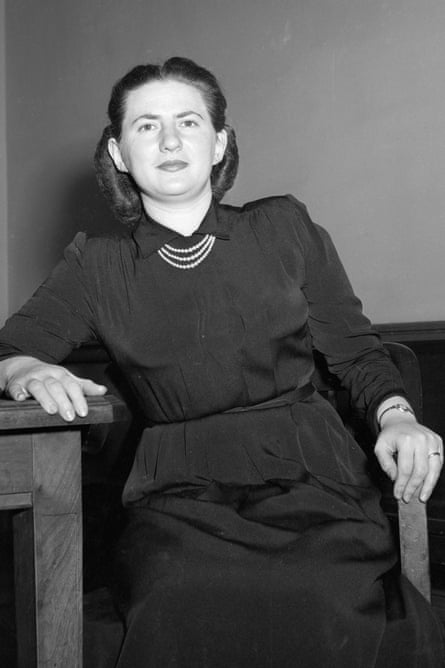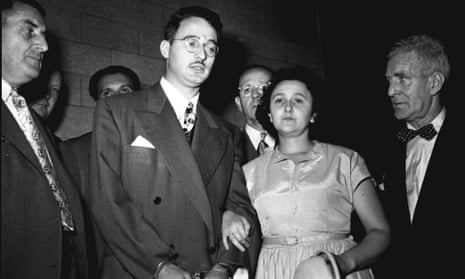The long-secret testimony of a key witness in the espionage case against Ethel and Julius Rosenberg, the cold war’s most notorious spying trial, is to be released after a group of archivists successfully petitioned a federal judge in New York.
Citing the historical significance of the testimony, judge Alvin K Hellerstein ordered on Tuesday that the grand jury testimony be unsealed. The testimony of key witness David Greenglass, Ethel Rosenberg’s brother, has been sealed for nearly 64 years.
Both Julius Rosenberg and Greenglass worked in Los Alamos, New Mexico, while the US tested the atomic bomb there. Rosenberg had worked as a machinist in Los Alamos, and Greenglass was an army sergeant at the time.
Rosenberg was an outspoken communist, and is believed to have recruited Greenglass to help collect secrets as the bomb was developed in 1944 and 1945.
The FBI began investigating members of the group, including Greenglass, the Rosenbergs and others, after the USSR announced in 1949 that it had developed an atomic bomb (to the shock of the US).
The Rosenbergs were indicted on espionage charges for passing nuclear secrets to Russia in 1951, after Greenglass implicated his sister in the conspiracy just 10 days before the trial.
The Rosenbergs were executed in 1953. Greenglass would tell reporters decades later that he lied on the stand to protect his wife Ruth, helping lead to the deaths of his sister and brother-in-law.
Speculation about Ethel Rosenberg’s innocence continues to this day, though Hellerstein noted that Julius did indeed appear to be spying for the Russians, based on intercepted cables.
Both maintained their innocence through multiple appeals against their death sentence.
Ruth Greenglass, though she was never indicted, may have played the role that Ethel Rosenberg was accused of, typing notes for Julius Rosenberg to send to the Russians. David Greenglass died last fall at 92.

“The requested records are critical pieces of an important moment in our nation’s history,” wrote Hellerstein. “The time for the public to guess what they contain should end.”
Greenglass’s testimony represents some of the last to be released. In 2008, Hellerstein agreed to release the grand jury testimony of 43 of 46 witnesses against them, but Greenglass’s family and the federal government argued against the release of his testimony, arguing it would “rekindle antipathy toward the Greenglass family”. The Greenglass family has lived under an assumed name for 50 years, Hellerstein said.
At the time of their conviction, the Rosenbergs were derided by politicians and judges alike, and blamed by the sentencing judge for causing the death of 50,000 people in the Korean war.
“I consider your crime worse than murder,” wrote Judge Irving R Kaufman in the Rosenberg’s death sentence. “I believe your conduct in putting into the hands of the Russians the A-bomb years before our best scientists predicted Russia would perfect the bomb has already caused, in my opinion, the communist aggression in Korea, with the resultant casualties exceeding 50,000 and who knows but that millions more of innocent people may pay the price of your treason.”
The testimony of Max Elitcher will also be released. Elitcher was briefly the roommate of the Rosenberg’s co-defendant Morton Sobell, and said that Julius Rosenberg asked him for classified weaponry information to pass to the USSR.
The testimony of another key witness, William Danziger, remains sealed because archivists have struggled to determine whether he is still alive, Hellerstein said.
The petition was filed by leading historical associations, including the American Historical Association, the American Society of Legal History, the Organization of American Historians, the Society of American Archivists and journalist Sam Roberts, who authored a biography of Greenglass.

Comments (…)
Sign in or create your Guardian account to join the discussion